Top Pick for
Overall stud finder
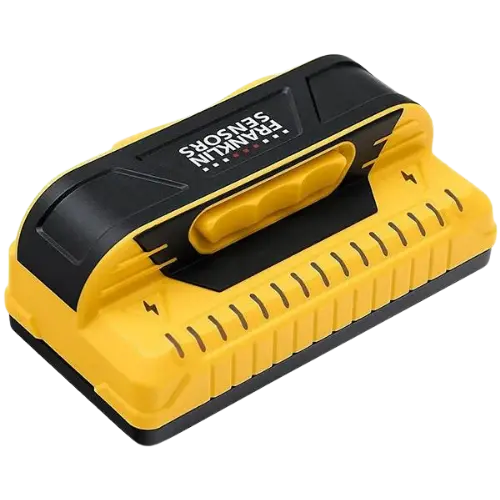

Top Pick for
Overall stud finder

Top Pick for
Magnetic stud finder

Top Pick for
Electronic stud finder
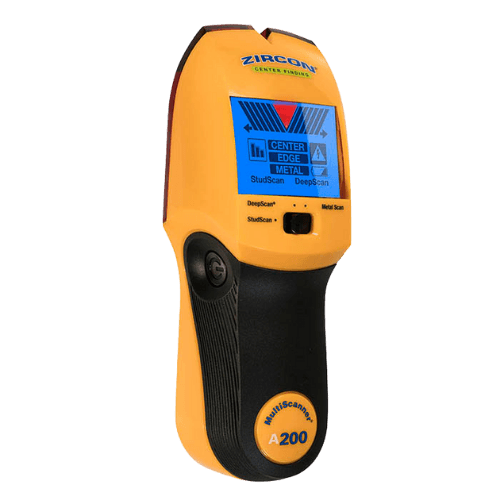
Top Pick for
Stud finder for floor and ceiling joists
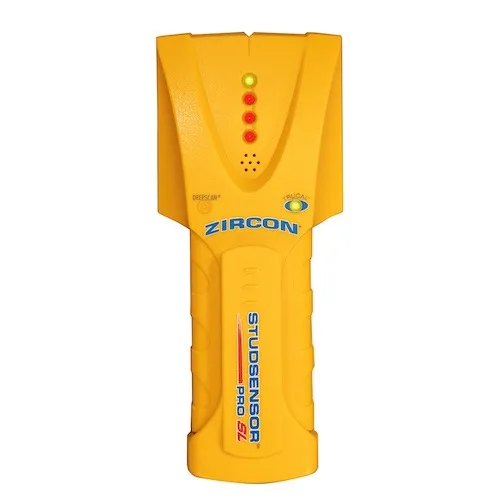
An essential home improvement and construction tool, a stud finder helps determine the location of studs behind a wall. This nifty device can help you find a strong and stable part of a wall to screw something on. It can be magnetic or electronic, depending on the model and price point.
A stud finder is a useful tool that most professionals use, but it can also make hanging pictures and other DIYs around the home a lot easier. To find the right stud finder for your needs, consider whether you want an electronic or manual option. Magnetic models are the cheapest, but they might not be the most user-friendly. Electronic or battery-operated stud finders offer tons of features like an LCD readout screen, LED indicator and AC wire warning. However, they're pricier.
We evaluated numerous stud finders found on Amazon to help make your buying decision easier. We picked models based on customer ratings and reviews. We also chose stud finders for each category based on key product features such as scanning depth, ease of use, price and added functions.
Read more detail on our methodology below.

For the best overall stud finder, we picked the Franklin Sensors FS710PRO ProSensor 710+. On Amazon, it has a rating of 4.4 out of 5 stars.
This stud finder features 13 sensors to produce accurate reading each time. It also has a user-friendly mechanism – just press the button when placed on a wall to detect studs. Once studs are detected, the LEDs will light up. The brand claims it can scan a wall of up to 21 square inches with a depth of up to 1.6".
Customers praised the product's ease of use, accuracy and added features. It has triple accuracy technology that helps analyse and triangulate data. For the price, you'll also get a built-in level and ruler, making it a handy tool for home improvement and professional use. Powered by 2 AA batteries, this can detect electrical wires as well. Several users wish it had a sturdier casing, but this seems to be a minor concern.

This magnetic stud finder doesn't need batteries to power up, detecting studs up to 0.5" deep. It uses a powerful magnet that claims to work with most construction types, including plaster, sheetrock and wood lath.
Because it uses magnets and doesn't need calibration, this stud finder doesn't produce false positives, giving you accurate results each time. It contains a super magnet with a 1" diameter. Reviewers said it is easy to use, perfect for beginners. It also detects studs in no time. It measures 20.32cm x 15.24cm x 5.08cm, which some people with larger hands might find too small for their liking.

The MultiScanner A200 has a patented SpotLite Pointing System that makes stud detection easy and accurate. It also features a Signal Strength Indicator to help identify shallow and deep targets. Apart from a 3-mode selector switch, this nifty device has an LCD screen, Wire Warning Detection function and Auto Correcting Technology that automatically corrects common errors.
With Deep Scan and Metal Scan functions, this stud finder can be used to detect ferrous metals. It can also scan up to ¾" of depth when in Stud Scan mode, making this tool an all-around workhorse for home and professional use. It has an ergonomic grip that customers found to be comfortable to hold at any angle. Powered by a single 9V battery, this works great on different walls like concrete, plastic and wood. However, it doesn't detect studs and metals on tiled surfaces.
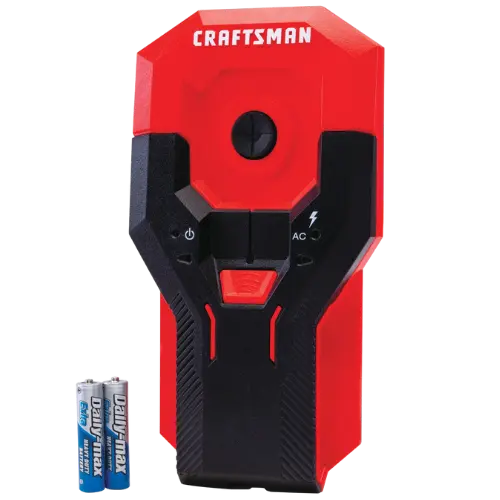
This stud finder features a depth range of ¾", making it ideal for detecting studs on drywalls and surfaces covered in wallpaper or fabric. It also has edge detection to locate the edges of wood and metal studs. Apart from being water-resistant, it has a shock-resistant body for long-lasting durability. This tool requires a 9V battery that is not included in the package.
The general sentiment is that this is an affordable device suitable for home use. It can detect stud edges and energised wires quite easily. It also has a 3-laser distance measurer that provides accurate results at a click of a button. Customers added that it is easy to use – just place it on a wall, hold the activation button and it'll start detecting studs. It's not as accurate as more expensive models, but it does the job for home improvement projects.

Similar to the MultiScanner A200, this stud finder has a SpotLite Pointing System that signals when a stud edge is found. It also features the brand's patented over-the-stud indicator, alerting users to start scanning in a different area if scanning begins over a stud. Additionally, it has a Stud Scan mode for locating edges of wood or metal studs up to ¾" deep. For thicker walls, you can use the Deep Scan mode, which claims to have a scanning depth of up to 1½".
At under $60, this stud finder is a sturdy home improvement and construction tool worthy of the price tag. Customers reported that it accurately detects studs and joists behind walls, ceilings and floors. Its SpotLite Beam feature, which provides a light beam, makes stud detection a lot easier. While it has a bit of a learning curve, this device is a trusty addition to any tool kit.
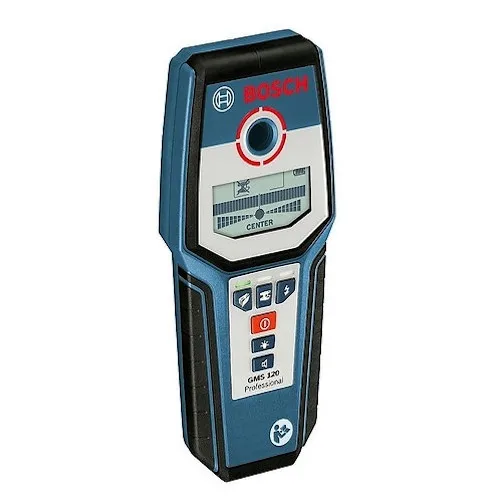
Powered by a 9V battery, the GM120 has multi-mode laser detection for finding wood studs, rebar studs, steel or copper pipes and live wires. It features 3 Sensor Laser Technology for scanning cured concrete walls up to 4¾" deep. It also detects live wires with up to 2" in depth and 3⅛" for coppers. Additionally, it self-calibrates and has an illuminated LCD screen to indicate mode, detection strength and more.
Numerous reviews were impressed by the product's ease of use, accuracy and versatility. Its Centre Finder feature makes it a lot easier to find the object centre. And because it is self-calibrating, this stud finder is beginner-friendly and is ready to use out of the package. Despite claims of live wire detection, several users reported that this function is quite hit or miss.
For this list, we examined numerous stud finders listed on Amazon. We evaluated models from the following brands:
We evaluated numerous stud finders found on Amazon to help make your buying decision easier. We picked models based on customer ratings and reviews. We also chose stud finders for each category based on key product features such as scanning depth, ease of use, price and added functions.
We narrowed down our choices based on customer ratings and reviews (as of February 2022). We also considered each model's key product features, price, ease of use and added functions. We came up with what we believe to be the 6 best stud finders you can buy online.
A stud finder is a handy tool that helps detect studs behind a wall. It has electronic or magnetic sensors that look for changes in wall density and nails to find a stud as accurately as possible.
Magnetic stud finders use a magnet to detect the fasteners behind a wall. Users are then alerted once the magnet is attracted to a metal fastener. Electronic stud finders detect the changes behind a wall to find a stud. These tools have an audio or on-screen alert that indicates if a stud is reached. Some electronic models can also detect other metal objects and live wires.
There are various types of stud finders available in the market. Not all stud finders have the same purpose.
Consider the following factors when choosing a stud finder for your needs:
Choose between magnetic or electronic sensors. Magnetic ones don't need calibration but aren't the most accurate. Electronic stud finders are pricier and might require calibration, but they are easier to use and provide more accurate results. A magnetic finder is great for home use, but for professionals, an electronic option is a better workhorse.
Consider if you want a finder that detects the edge or centre of studs. Edge stud finders are more common as they provide the most accurate detection. Centre finders, on the other hand, find the centre of a stud or joist.
Most stud finders have a scanning depth of at least ¾". However, if you plan to use this device on thicker walls, look for an option with a scanning depth of up to 1½".
Search for a stud finder that is compact and lightweight. Choose a model that can easily fit into your pocket for better portability.
If you plan to frequently use your stud finder for various jobs, consider picking a model that has multiple functions. Some stud finders can detect joists, metal objects and wiring. Others also have ruler and level features.
Other features you might want to consider are audio and display alert indicators and wire warning function.
Check out these steps to learn how to use a magnetic or electronic stud finder:
Magnetic stud finder:
Electronic stud finder:



Here are the top air compressors you can buy in Australia right now.
These are the 7 best soldering irons you can buy right now in Australia.
From the best dot laser level to the top model for builders, we’ve rounded up the six best laser levels you can buy right now in Australia.
From the best step option to the top product for attics, these are the 8 best ladders available online.
We’ve found the 10 best chainsaws for all your home and gardening needs.
Whether you’re a hardened tradie, aspiring apprentice or DIY king, any woodwork project needs the best table saw in Australia.
We've rounded up the 8 best pressure washers available online.